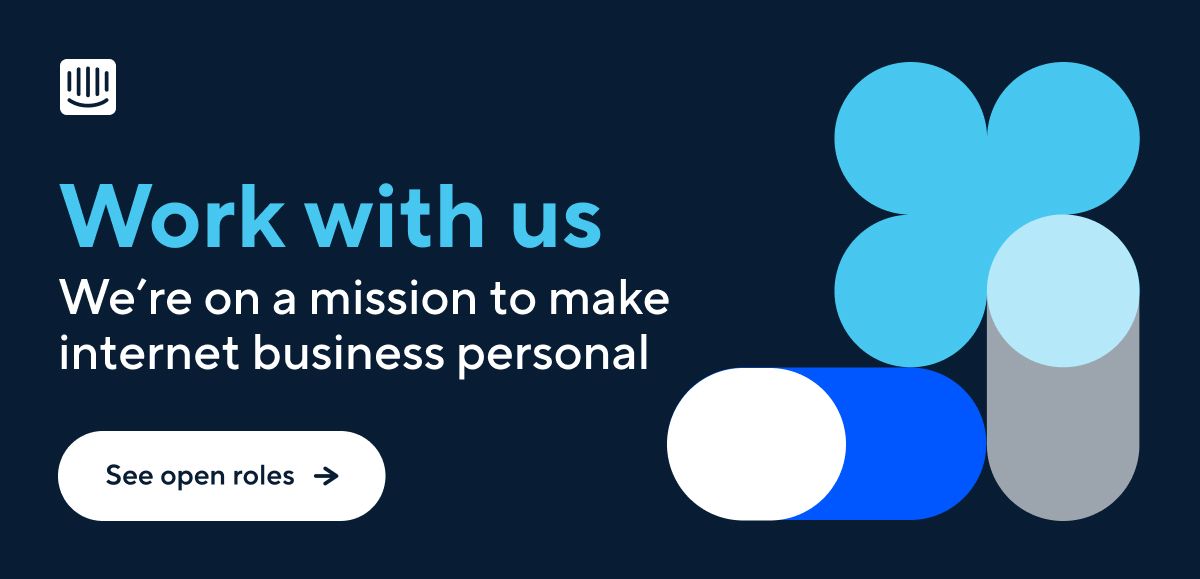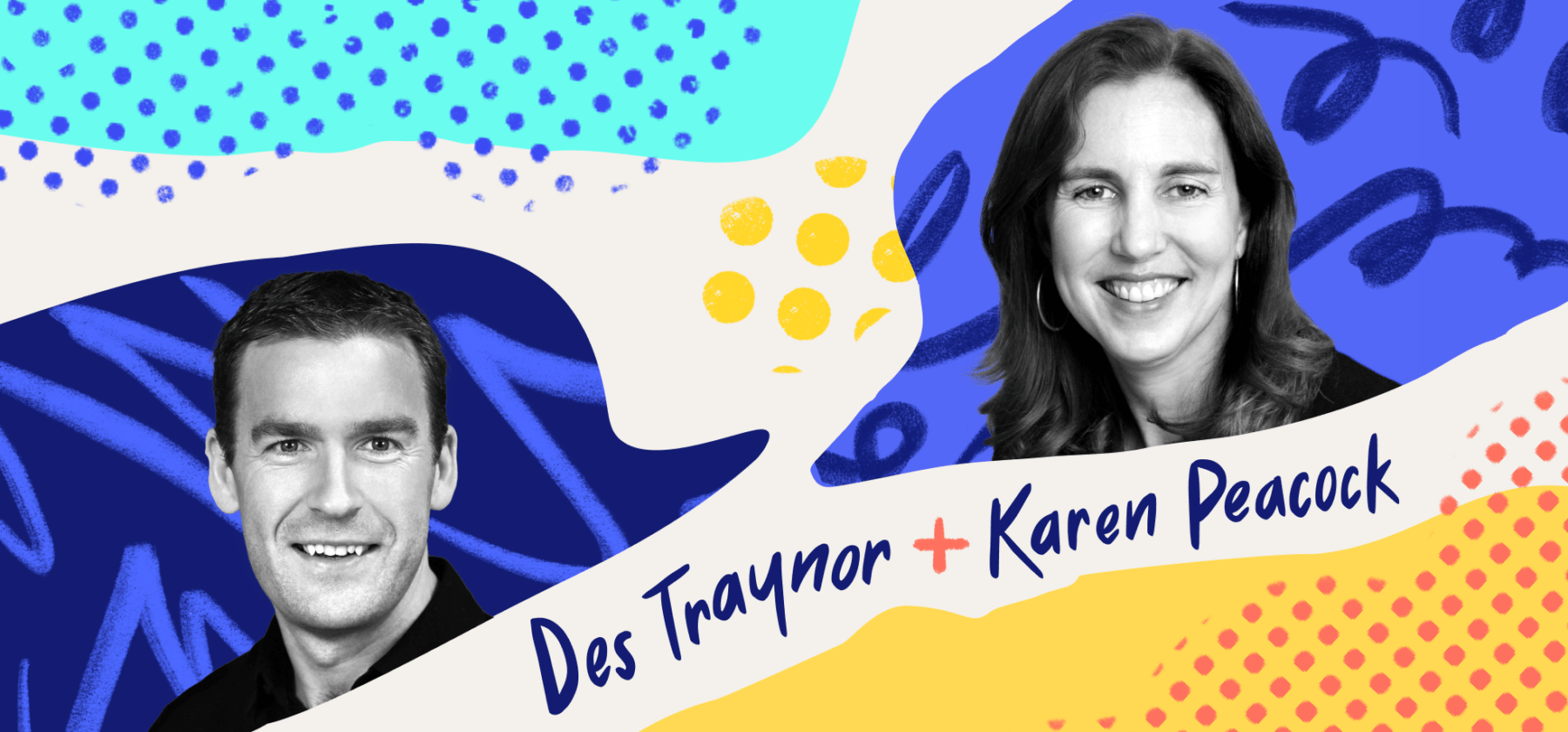
Reflecting on the Intercom journey – Karen Peacock and Des Traynor in conversation
In today's conversation, Des Traynor and I share our thoughts on our careers and Intercom – from an aha moment in 2011 to this year's pandemic, and beyond.
In this very special episode of Inside Intercom, I sat down with Des, our co-founder and Chief Strategy Officer, for a wide-ranging conversation about our respective journeys so far, our thoughts on Intercom through the years, and what the future holds.
Short on time? Here are a few quick takeaways:
- Focus on your customers. Don’t just listen to what they say – watch what they do, understand their world and their challenges, and consider how your product integrates and fits in with everything else happening in their lives.
- In times of crisis, it helps to keep company values in mind – after all, they’re your North Star. Do right by your staff, look out for their safety, and remove hurdles to help them do their jobs.
- Make it easy for customers to talk to you, and vice versa. Frequent touch points and positive interactions will create strong relationships and build customer loyalty. It’s much harder to grow a business without loyalty.
- If 2020 taught us anything, it’s that a passive attitude towards non-discrimination isn’t enough. Think about what you could be doing to bring more diversity into your teams and be more inclusive as a company, and go actively out of your way in order to achieve set goals.
- Be open-minded. No matter how many years you’ve got under your belt, there are always things to improve and blind spots in your approach. Hire people who can point those out and help you to constantly progress.
If you enjoy our discussion, check out more episodes of our podcast. You can subscribe on iTunes, stream on Spotify or grab the RSS feed in your player of choice. What follows is a lightly edited transcript of the episode.
Karen: I’d like to welcome you all to this very special episode of Inside Intercom. We’ve decided to do something a little bit different this week, and today’s episode won’t be an interview where I interview Des or vice versa, it’s just going to be a conversation between the two of us. We’re going to be sharing our perspectives about Intercom and other broader topics as well. Des, thanks very much for joining me today.
Des: I’m excited to be here. This is our first podcast together, so this will be fun. I usually do them with Paul or people from the product teams – it’s much more fun to be on a podcast with your boss.
I’m delighted to be here, Karen. I’ve been here quite a long time, and you’re obviously our CEO. I think a lot of our listeners know plenty about me because my career kind of is Intercom, and I think you’ve had an impressive career pre-Intercom that maybe folks won’t be as familiar with. Perhaps you could just give us a bit of background – why did we hire you as CEO?
From the Midwest to Silicon Valley
Karen: So I grew up in the Midwest of the United States, in the Chicago area. I always loved problem-solving, finding complicated things and breaking them down into simple pieces, helping people, and building things that made people’s lives better. I moved out to the East Coast of the US to go to Harvard where I majored in applied math with a focus on decision systems and artificial intelligence before it was cool. And let me tell you, it was definitely not at all cool at that time, but it inspired me to realize that there are some things that humans are particularly great at doing, and then there are things that we can automate in ways that make people’s lives better.
After college, I went to work at the Boston Consulting Group, BCG, which was my first experience in business. And so I worked with a whole bunch of companies in technology and financial services, consumer goods, helping them on things like growth strategy, developing new products, M&A. I then went to Stanford, moved out to California, where I’ve been for the last 20 + years. And I met my husband, Eric, out here.
Des: Did you move to Stanford for the MBA?
Karen: Yeah, exactly – for the MBA. I had wanted to be in tech because I’d done a bunch of coding undergrad and engineering undergrad, and as tech started to take off in the mid to late nineties, I knew that I wanted to be in the Bay Area, in Silicon Valley. Stanford was actually the only business school that I applied to because I specifically wanted to move out to the Bay Area and move into tech full-time.
“After business school, I realized I love building things – building products, building teams, building companies. And at that time, I was mostly building PowerPoint decks”
After business school, I did more work in strategy consulting and realized I love building things. I love building products, building teams, building companies. And at that time, I was mostly building PowerPoint decks, which was not really what I was seeking to be building. And so after a few more years doing that, I left and joined a startup. And that was my first time in enterprise software – I’d spent some time in consumer software before that and did that for a few years. My company was acquired by a bigger company, which was then acquired by a bigger company, et cetera.
Then, I moved to Intuit and worked there for 14 years. I never had any plans to be at one company for that long, but I just kept doing new and different things there – I started in product management and then did a combination of product management and marketing and design. I was a general manager of a couple of different businesses, I was able to develop and launch from scratch two different products and businesses and grow those into big thriving businesses today, which is exciting. And I ended up as the SVP of Small Business at Intuit, where I was responsible for all of Intuit’s products and services for small businesses, like QuickBooks Accounting, payroll, and payments.
“We would do what we called follow-me-homes, where you actually follow a customer – I mean, with their permission, this is not a stalker thing – to their place of work and watch them do what they do”
During the time I was there, we grew that small business division from about $500 million in revenue to about $2.5 billion, and we grew the company from about a $5 billion market cap, which is not a small company, to over $50 billion in market cap. So huge, huge growth during that time. One of the things that I really took away from all my years at Intuit was spending time with customers. We would do what we called follow-me-homes, where you actually follow a customer – I mean, with their permission, this is not a stalker thing – to their place of work and watch them do what they do, whether that’s at home or in the office.
Of course, that’s a little bit trickier now, but the whole idea is to hear their comments on your product, but also watch what they do and not just listen to what they say – that is, watching what they do in the context of everything else they’ve got going on in their world because all of us operate in a deeply interconnected world. And so, a part of what I’ve always brought with me is that it’s important to focus on your customers –watch what they do, not just what they say – and think about things as a whole ecosystem. You should think about how your product integrates with and fits in with everything else that people have going on in their lives.
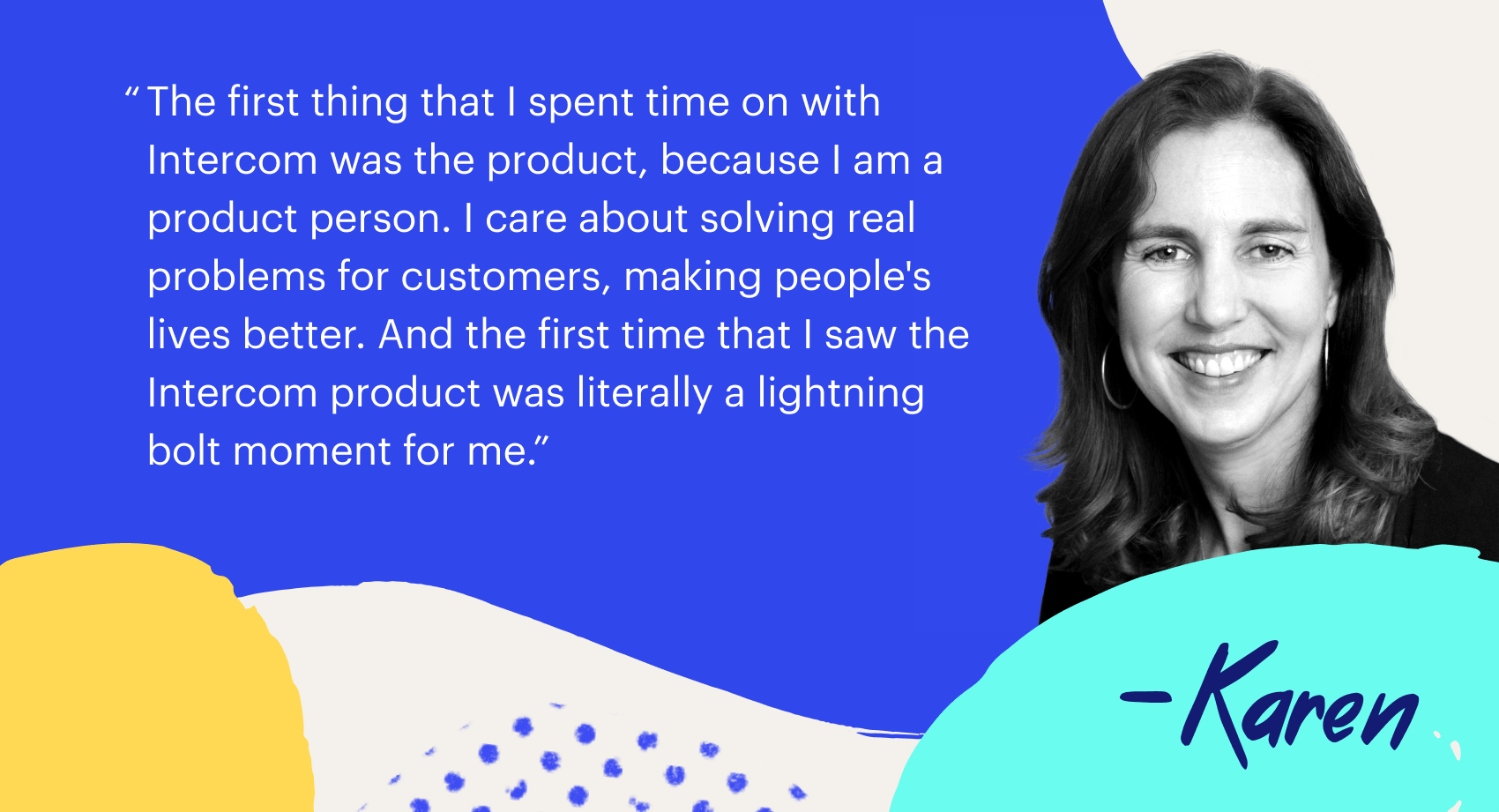
At the same time, I was doing a bunch of startup advisor work. I was on a board of a private software company and I was just getting the itch to do something much, much smaller, much more entrepreneurial. And so, after 14 years, I was like, “You know what, it’s time. If not now, then when?” I made the leap and started doing a lot more actual advisor work, board work, and got a chance to meet you and Eoghan and Ciaran and the rest of the team.
Along the way, I guess I should say, on the personal side, I met my husband in business school. And I’ve got two kids, my son Jack, who’s 16, and my daughter, Katie, who’s 13. And that’s been really fun during the pandemic. I think our biggest point of stress has been competition for wifi.
Des: It would sound like you’ve gone from a scale where software companies can’t really get much bigger, and you’ve obviously come all the way down. I think Intercom was maybe what, 400 people when you joined?
Karen: Yeah, we were at just over 300.
Des: Just over 300, right. So it’s quite a drop. I’ve never worked in a company larger than Intercom. And that’s always been true since Intercom was 11 people or something. What fuelled your desire to go smaller?
Karen: In a big company, you have both benefits and costs of the overhead of the big company. So when you want to bring something to market, you have this tremendous channel where customers already know who you are, and you can just kind of add another thing in there. But on the other hand, at a small company, you have the opportunity to do things that are unique and different.
“It’s sort of like driving a big yacht versus driving a sports car. There are good things about both of those, but I choose a sports car”
Just this summer, in the middle of the pandemic, folks were working incredibly hard, and we had just launched some tremendous things. And we decided to shut down the office for a week and say, “Everyone, take your normal vacation time, of course, but above and beyond that, we’re just going to take a break for a week.” That’s the kind of thing that’s very hard to do in a 400 to 500 person company. But it’s very possible and exciting and fun to do in a much smaller place. So you get to do kind of fun and cool things like that and control your own destiny. It’s sort of like driving a big yacht versus driving a sports car. There are good things about both of those, but I choose a sports car.
Des: And here we are.
The siren call of bootstrapping
Karen: So, we’ve talked a little bit about my background and leading up to me joining as COO. I would love to hear about your experiences – what was going on in the early days? In terms of what you and Eoghan and Ciaran and David were building.
Des: At the start, Intercom was actually built as a feature of another product, believe it or not. In fact, we weren’t even calling it Intercom at the time. We were working together as consultants, where we basically designed and built software for other people. Our best customers at the time were Silicon Valley startups, and the reason they were the best was that the dollar was significantly out-performing the euro. So we were simultaneously the highest-earning consultants in Dublin and the cheapest consultants in the Valley, doing high-quality startup work.
Karen: That’s a good value prop.
Des: It is, it’s proper startup arbitrage, I guess. There was also one other benefit that Intercom has been able to benefit from, which is that the folks based in San Francisco would give a lot of feedback, and then, while they were going to bed, their feedback was acted on. So they’d wake up the following day to a new release of software. And I remember in the early days of Intercom, Eoghan was in San Francisco and every single day was Christmas for him because he’d wake up to a new wave of features that Ciaran and Dave had shipped. Every single time he’d refresh the product, there’d literally be new buttons and stuff appearing all the time.
“A bad product in a great market will do better than a great product in a bad market”
But as I said earlier, we started it because we had a different startup, though it’s probably fair to say it wasn’t working so well. You’re familiar with that Marc Andreessen idea that the market is more important than the product, as in, a bad product in a great market will do better than a great product in a bad market. We had an idea for a product which was developer monitoring tools specifically for exception handling – whenever anything went wrong in live production software, it would alert the developers. At the time, that was a really niche-ish idea because the B2D idea of selling directly to developers hadn’t really kicked off. We were charging $9 a month and having to justify why nine, and nine is a lot of money. We were definitely early. It’s also fair to say neither I, nor Eoghan, nor any of us, really, had a lot of passion for the area. It was an idea that made sense, but it wasn’t something we cared a lot about.
Today, I see a lot of different tools in this exact space that have gone on to raise tens of millions of dollars and do a lot better, but it was clear we were struggling to make it work, and we had to consult most of the week, so we didn’t have a lot of hours to put into it either. The net effect of all this was that we kind of had a business that was growing, but slowly. It clearly wasn’t taking off. The type of thinking that we were following at the time was just Basecamp, or 37signals, as they were known, where you have a consultancy and you have a side business, and at some point, the side business outpaces the consultancy and you can stop doing consulting work.
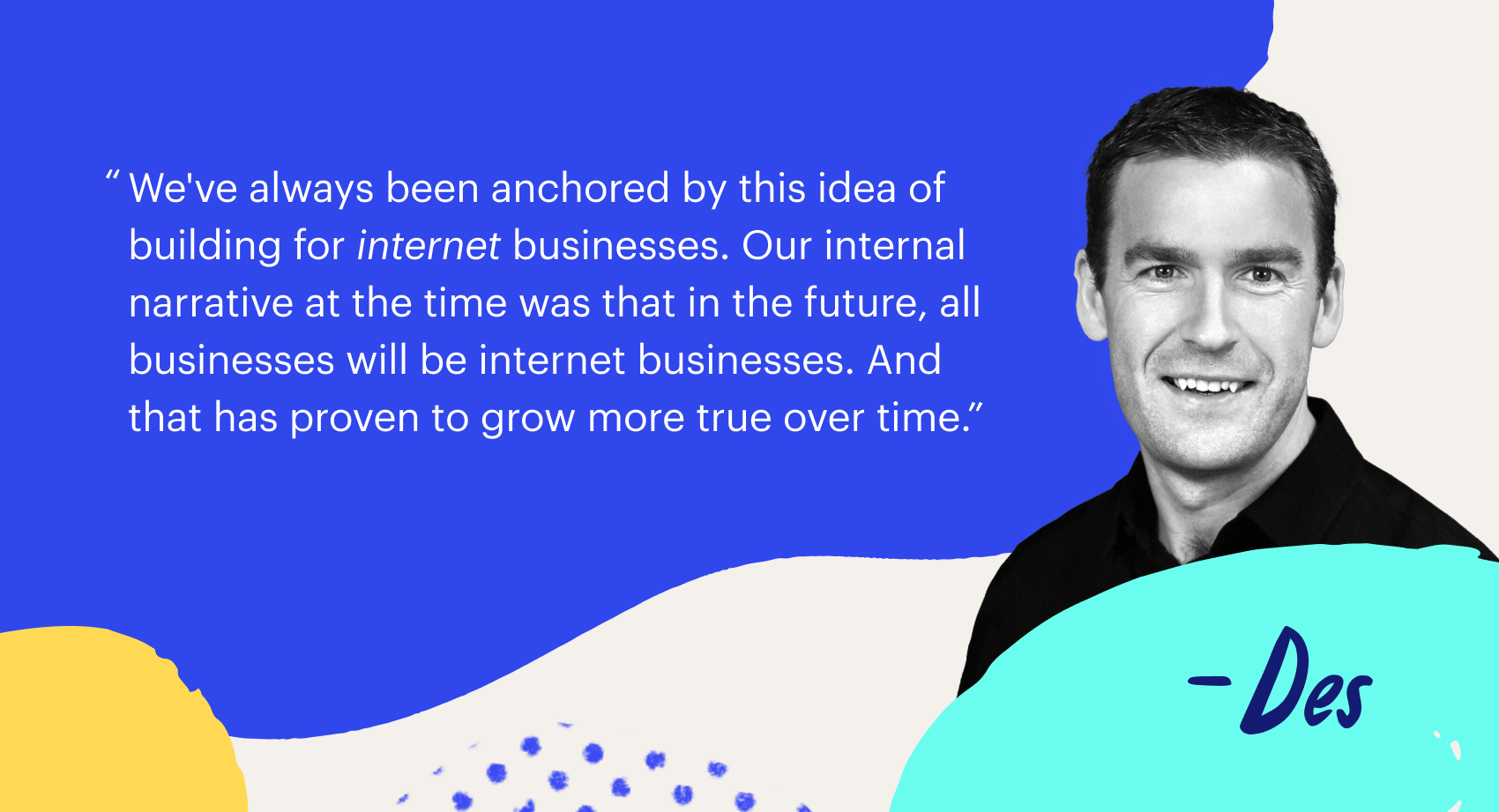
So we were very excited about the idea that we could one day stop doing consulting work. At some point, we realized it just wasn’t going anywhere fast enough. And as a side note, a slightly spicy opinion, I think a lot of bootstrap businesses fall into that category where they’re growing, so you don’t want to kill them, but they’re not growing very fast. And the fear, or at least my fear for folks running those businesses, is that it might take them three and a half years to realize this is never going to be the thing. And had they raised half a million quid and tried to blow it up early, they would have realized, in six months, it wasn’t going to be the thing. I think there’s this dichotomy that people swing between bootstrapping versus venture capital. And the one thing about the bootstrapping choice is you’re choosing to invest years of your life, whether you know it or not, and they’re often the best years of your career. So I’m thankful for Eoghan, who made the hard call to go all in on something that’s definitely going to happen here.
At the time, we were all based in Dublin. We had this thing called Exceptional and people were using it a little bit, but we had no easy way to talk to them. The state of tooling in 2010 or 2011 was that there was no Stripe, there was no subscription management and the idea of a SaaS economy was just nonsense. The way you talked to your customers was by exporting your PayPal dashboard because everyone used PayPal for subscription back then. You’d export that, and then get Ciaran to flag the people who were actually actively using the product because they’re the ones you’d really want to talk to. You’d import all that into Campaign Monitor or MailChimp, send out an email and get a load of out-of-office replies back for all your efforts. It was just the most broken system ever.
“We were actually talking to customers. Why the hell is it so hard? So we invested in this idea of making it easy to talk to customers. Which customers? Active ones. What about inactive ones? All right, let’s make it easy to talk to them too”
The logo for Exceptional was a little star that sat in the bottom right-hand corner of the product, and one day, a little speech-bubble popped out of it. And it basically said, “Hey, we’re the team from Exceptional, what would you like us to work on?” And man, the most interesting thing happened, which was everyone replying for the first time ever. We were actually talking to our customers, which is a really important thing to do. Why the hell is it so hard to do? So we invested hard in this idea of making it easy to talk to customers. Which customers? Active ones. What about inactive ones? All right, let’s make it easy to talk to them too. We just kept investing in this idea that it should be easy to talk to your customers. And very quickly, as we were building this other idea, Exceptional customers started saying, “This thing’s really cool, how do I get one of these?” And that’s when the penny dropped, that this was probably a bigger idea than the idea it was sitting in.
The early days of Intercom
So we sold off Exceptional, decided to raise a million dollars, Eoghan went to San Francisco to raise money, and I stayed behind with Ciaran and David and we worked on the product. Once we had sold our Exceptional product, we had this new problem – we had this tool for gathering user feedback, but no users. We had to build the other half of the tool because all we had was the front-end side of it. So we quickly had to build the product out and get actual users up and running.
We did all this, we had our first private launch, I think it was July 1st, 2011, and we went to number one on Hacker News, which was a huge deal – it’s like being in the top right of the Gartner Quadrant, except for cool startups. Once we went number one on Hacker News, that’s when I realized this thing wasn’t just us: every single internet business on Earth needs to talk to their customers and there was no tooling to make it possible.
Karen: Interesting. There’s a lot of similarities between that and the Slack founding story, for example, where the tool within the tool turns out to be the thing that was needed by absolutely everybody.
Des: Totally, and I think Yammer was the same. Even Stripe, I think, they didn’t set out to build payments so much as they set out to try and charge, and when they started to try and charge, they realized how hard it was to do payments and they’re like, “Well, let’s go solve that and then we’ll come back to this other idea.”
“There’s a temptation to pigeonhole startups into a category so they can check a box and say, “This is a billion-dollar category”
We incorporated in San Francisco on August 15th, 2011, I think. We came out of private beta on January 27th, 2012, where we announced that we’d raised a million dollars. It was a complicated raise and there were a lot of people involved in the round because people could see the problem, but not the category. They were like, “I can see what you’re doing, but I don’t know, are you a help desk, or are you a marketing tool? Or what are you?” There’s a temptation to pigeonhole startups into a category so they can check a box and say, this is a billion-dollar category. And at the time, our answer to all these things was: we’re the way businesses and customers are going to talk. It’s been 10 years of trying to avoid this problem, but I think the actual answer might be, we just have to be a really good communication tool for businesses and customers to talk. And, yes, that means we have to be good for targeting, marketing, messages, and yes, it means we need to be really good at structuring thousands of inbound conversations and doing ticketing workflows and triage and all that sort of stuff.
Once we got the money, we immediately started hiring. We were pretty Dublin-heavy in terms of our hiring early on because all the money goes into product at the start and we’d decided we wanted to consolidate product in Dublin. It was really not until series A that we started thinking about marketing and more San Francisco-based hiring, and then, later on, sales. And if I keep going, I’m going to walk us through the entire company history, but that’s what was going on while you were dominating the world with Intuit.
Finding our North Star
Karen: You were creating a whole new category and building something incredible. I think that absolutely every company, as you said, needs to talk to their customers, and having that single path that punched through the wall that the internet had set up was a huge deal. One of the other things that I think that you and the rest of the founding team did that was so brilliant was to set up a durable mission for the company. Can you talk a little bit about the mission for the company, how that has or hasn’t changed over the years, and what that means to you?
Des: The idea of a mission was inspired by one of our advisors at the time, Paul Adams, who obviously, as you know well, is our SVP of Product here at Intercom. I remember we had this horribly small office and it was a weird shape, it was really long and narrow. We had one wall where we put nine whiteboards in a row and we put them portrait-style so you could write out a kind of a manifesto. And we had this manifesto, and at the time, Eoghan and I were anchoring the whole thing off this idea of relationships. In fact, some of our earliest customers will know the original Intercom ship was the relationship score, and it would tell you how strong of a relationship you had with the customer, based on how much of a back and forth you’d have with them. So it could tell you who you’d grown a relationship with and who was slipping away, and that was one of the ways we were encouraging people to talk to their customers.
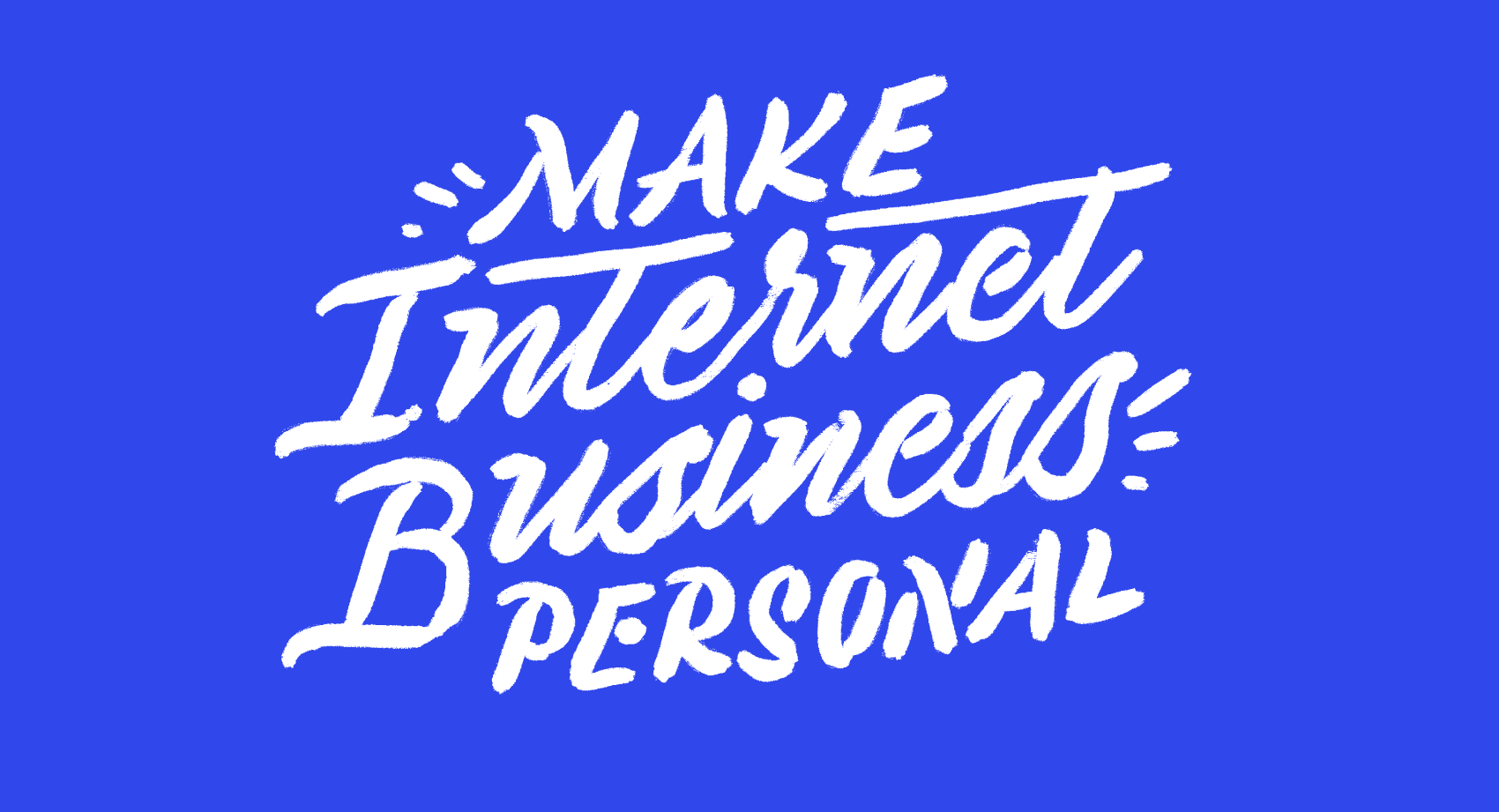
But the idea was: why is talking to your customers important? A large part of it is that you get a unique insight into what you should do and all that, but there’s another part of it, which was what drew us in: this idea of building a relationship. We were working out of a coffee shop at the time, witnessing a barista grow an entire global brand, one relationship at a time, to a ludicrous degree. His company, 3fe, has gone on to become incredibly successful. So we were anchored on this idea of letting internet businesses grow relationships. And why relationships? Well, it all comes back to loyalty. You grow customers by acquiring them and keeping them and you keep them through loyalty. And where does loyalty come from? Loyalty comes from a strong relationship. And where does a strong relationship come from? Frequent touch points and frequent positive interactions. And what do they look like? Communication. And the antithesis of that would be a business that never talks to its customers and is based entirely on a transactional relationship.
So when we started, we were heavily skewed to this idea that relationships matter. At the time, Paul had done a heap of research, now kind of famous and infamous, about social networks and how they grow. And he won’t appreciate me saying this, but the deck that he produced was a leaked template, it was number one on Hacker News and TechCrunch and all that. It was the deck that underpinned the entire strategy for Google Plus, and then to add fuel to the fire, Paul left for Facebook. So anyway, one of the things he kept saying was that great companies are mission-focused. It’s not that they have a mission, it’s that they’re on a mission and the mission is the only thing they talk about. And our mission was to make internet business personal. We’ve held on to that for 10 years and I really don’t see it changing in the near future anyway.
“Nearly everyone I’ve spoken to about our mission has always suggested we take the word internet out of it”
The challenge with a mission is, as you know well, it says a lot about a north star, but it doesn’t say anything about how you’re going to get there, so there’s a lot left unsaid in such a simple statement. Perhaps the most interesting is that nearly everyone I’ve spoken to about our mission has always suggested we take the word internet out of it. In fact, I think we hired some branding agency at one point for like 50k to do this deep, messy bit of research, which concluded, “We think your new mission… Are you ready? It’s to make business personal.” And we were like, “Wrong.” Because when you say internet business, you’re immediately zooming in in a really useful way that you don’t get when you just say business. I think we’ve always anchored in this idea that we’re building for internet businesses. One of the things we added to our internal narrative at the time was that in the future, all businesses will be internet businesses, and that has proven to grow truer over time. COVID-19 has only advanced it, of course, but even taxi companies became Uber or bookstores became Amazon. The future of business, in a sense, is 99% internet, with the exception of the tangible, like your local coffee store. And even then, you could argue it might have an app you’d order from, as Starbucks does.
“This sense of personal has been guiding us from a product perspective – it’s why you see faces in Intercom”
So when I think about the durability of the mission, I firmly believe it. We’re here to let businesses and customers connect in a real way, as they do in the real world, and we’re doing it for internet businesses. And the sense of the personal has been guiding us from a product perspective – it’s why you see faces in Intercom.
Karen: I absolutely agree, and I think a great mission is kind of the horizon that you keep your eye on. There may be times when you’re up and down with the waves, but that horizon of where you’re aiming towards is what your mission is setting for you. And I think that the mission that you developed is evergreen, it’s something that will continue to matter to us more and more each year.
Fixing customer support
Des: I remember talking to you at the time when you joined and you were saying it was one of the things that excited you about the company. I’m always curious to know what it’s like as an outsider looking in because I’ll never be able to independently adjudicate Intercom, I’m always going to make excuses for all the warts and I’m not going to see all the progress we’ve made. What did it look like to you when you were looking at us?
Karen: The first thing that I spent time on with Intercom was the product, because I am a product person, as I talked about before. I care about solving real problems for customers, making people’s lives better. And the first time that I saw the Intercom product was literally a lightning bolt moment for me. And I saw both what the product was at that snapshot in time in 2017, and then I had all of these ideas of where it could go over time and where it can still go from here. And this huge feeling of, “Oh my God, this is the product that I had needed in every SaaS business I have ever run.” And by then, I had run a lot of different kinds of SaaS businesses and I just saw and felt that customer need firsthand, exactly like you were talking about, for a way to be able to interact with your customers in a way that is personalized, contextual, automated when it should be automated, and personal and one-on-one when it should be personal and one-on-one, and to connect and build relationships with customers and help them drive their growth. And so that was very much the first thing that drew me to Intercom, the product, and seeing and feeling that customer need firsthand.
“All of these things that you could do with Intercom, you could do without any developer work or coding skills. A marketer could set it up, a product manager could set it up, anyone could set it up”
I was like, “I would buy this and I would pay more than $9 a month for it.” That was one part of it. And all of these things that you could do with Intercom – talking to your customers in these very personalized ways, setting up these campaigns with AB testing – you could do without any developer work required, without any coding skills. A marketer could set it up, a product manager could set it up, anyone could set it up. I remembered, in other companies, taking literally months, sometimes quarters, in the engineering queue of, “Well, this isn’t as important as this other feature, so we’re not going to build these capabilities and you’re not going to be able to interact with customers.” And each time I’d have to say, “You’re right, this other thing is more important, but can we just find a way to be communicating with customers? Onboarding them in a good, strong way?”
I also knew firsthand that when you interact with the customer in-app, you drive much, much higher engagement rates. And I think we have something like 8 to 10X the kind of engagement rates that customers typically see with a Marketo email campaign when you interact with customers in-product through Intercom. So that was definitely one thing. The second thing for me was the people, and I have found the people that I get to meet at Intercom to be incredibly smart. And I’ve known many very smart people in my life, and I’m sure you have too, and I’m sure all of our listeners have today as well, but it’s a much smaller percentage of those folks who I’d also describe as humble and down to earth. That’s exactly what I found – the Intercom folks who I got to meet were incredibly smart, brilliant folks, but humble, down to earth. And that’s even a part of our values, which is super cool.
It’s unusual to have folks who have a strong vision who are also open-minded. If you think about the strongest visionaries like Steve Jobs or Elon Musk, I don’t think anyone would say, “Oh, the next best thing about Steve or Elon is he is very open to get ideas from lots of different places.”
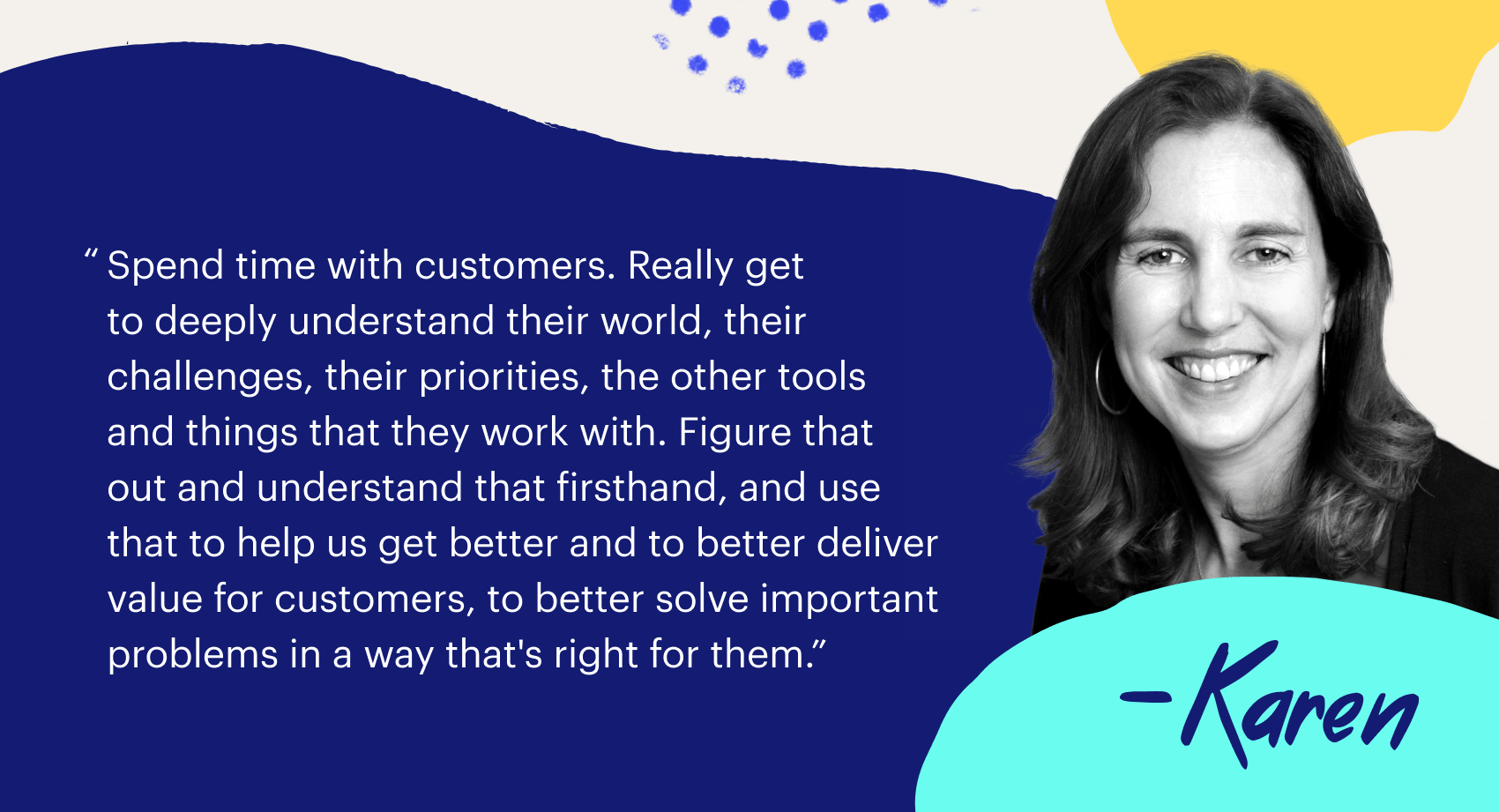
Another thing about the people is that the team consists of some folks who I consider to be true visionaries – folks like you, Paul, Eoghan, and others. You really had a vision for where the industry was going, and how products would evolve, and I had so much fun in conversations riffing on ideas with all of you. And I’d say it’s unusual to have folks who have a strong vision, and it’s even more unusual to have folks who have a very strong vision who are also open-minded. If you think about some of the strongest visionaries around like Steve Jobs or Elon Musk, I don’t think anyone would say, “Oh, the next best thing about Steve or Elon is he really is very open and always wants to get ideas from lots of different places.” I wanted to be a part of creating and building that vision with others who I felt had that strong sense but were open-minded and wanted others to be a part of that creative process.
And I think the third reason why I joined was the growth rate – incredible growth, incredible traction in the market, which was really, in many ways, just a validation of the first two points. This is a meaningful market with an important customer problem that we’re solving well and with some very talented and special people going after that. And so you would expect to see huge traction and growth and we’ve continued to see that. I mean, if you think about just in the last couple of years, we now have customers like Amazon, Facebook, Lyft, and we just brought on Samsung and Walmart. That was part of what drew me to Intercom. Maybe the short version is I joined for you, Des.
Des: I mean, I just assume that is true for everyone who joins because they have to put up with me either way. I often talk to people who are considering joining Intercom and the one discussion we have is: is there still whitespace ahead? Is there still enough risk? Because with risk comes reward, and with no risk, generally speaking, comes low reward or a very predictable, linear reward. I’ve always felt that we’re going to build multiple new lines of business over the next probably two, three years. We’ve done it over the last few years,and we haven’t actually checked this with anyone, but we expect the R&D team to deliver new, world-class products. Otherwise, what are we doing?
“I rarely talk about the past in Intercom because I don’t want to be one of those sports fans whose team last won a trophy 20 years ago, and they won’t shut up about it”
I hope it has felt like that for you, that the future is probably more exciting than the past. I rarely talk about the past in Intercom because I don’t want to be one of those sports fans whose team last won a trophy 20 years ago, and they won’t shut the hell up about it. For me, the reason I’m in Intercom and I love Intercom is because of what we’re going to do, not what we have done. What we have done is evidence of a bit of trajectory. I heard Patrick Collison reference that, in the marathon they’re running at Stripe, they’ve recorded a good time at the first mile. And I don’t want to totally copy his phrase, but I only look back to remind us that we’re moving fast and we’re making things. I spend most of my time looking forward. From your point of view, was there enough attractive risk edge uncertainty in the business to make it exciting?
Karen: Absolutely, and there still is today. When I joined, we hadn’t even yet done any kind of investment in automation or built out any kind of app ecosystem or deep integrations. And over the last three years, those have been two areas that we’ve gone a lot deeper in. Going forward, one of the areas that I’m particularly excited about is all the work we’re doing to make Intercom great for upmarket companies. All those companies I was just talking about – Amazon, Facebook, Lyft. We haven’t even been focused on selling to Enterprise customers, we don’t have a full Enterprise motion and already we’re getting all these kinds of customers in. And so it just tells me, “Holy shit, what’s going to happen when we’re actually fully aligned against that?” Which we are. For the last year and a half, we’ve done a series of investments upmarket and literally every single thing that we have tried has massively beaten our expectations, even in the middle of COVID-19. The fact that we were beating every single one of our pre-COVID-19 sales goals is incredible. And it tells me there’s so much more upside there.
“We’ve realized just how broken customer support is today. For the last 10 years, companies have had to choose between an efficient enterprise-grade system and an easy-to-use, consumer-grade front end”
As I think specifically about the problems we are solving from our customer’s perspective, you and I have both been spending a lot more time thinking about customer support and how our customers support their customers. And we’ve realized just how broken customer support is today. The way companies do customer support, the tools and technology they have today were awesome and cutting edge 10 years ago, and for the last 10 years, companies have had to choose between an efficient enterprise-grade system and an easy-to-use, consumer-grade front end. So consumer-grade front end, enterprise-grade back end, you have to choose one or the other. And that’s not a good spot to be in.
One of the things that I’m excited about that you and your teams have been focused on is building out that enterprise-grade back end, advanced ticketing workflows to handle complex queries, advanced reporting, ability to tie those into other external reporting tools, etc. So we are fully reinventing customer support and the way that our customers can support their customers. They no longer have to choose between what’s easy to use for their customers and a great back end that is efficient.
And we’re seeing huge, huge traction and success there – folks like Samsung and VMware are using us for that. I think that this is just the beginning because historically, we have seen a lot of companies use Intercom as a side-by-side tool. Now Intercom can become your primary support tool, even for larger companies. And to me, that is just one example of the kind of whitespace that we have ahead and the kind of reinvention that we’re doing. That’s an entire category that we are reinventing, so I very much believe that the future is brighter than the past and way, way more interesting than the past, and something that we will be reinventing in multiple different ways. That’s kind of what gets me excited in the morning.
When crisis hits you
Karen: Yes, it has. I was just thinking, we should talk about 2020, the pandemic. As a founder, how do you think Intercom has been doing this year? How well have we been doing in terms of retaining and building on what’s important to us as a company through the pandemic, through massive social unrest? How would you describe how it’s all going?
Des: I mean, it’s been a tough year. You could literally be selling Purell, the antiseptic hand gel – I think everyone has struggled this year, even if you are exploding for all sorts of positive COVID-19 reasons. Stuff can go wrong internally or externally all the time in any business. The question you always come back to is, well, “How do we react?” And in a sense, that’s why any company has values. It’s because they tell you what to do, they’re like an agreed sense of how we’ll behave at all times. You don’t get to pick and choose – values don’t only apply during good times, they apply at all times. And for us, the thing we moved to immediately was doing right by our staff. We were way ahead in terms of, first of all, looking out for the safety of our staff by closing all our offices before it was required. We also immediately kicked off ways to make it more comfortable for people to work from home.
“You’ve never built software if you think that putting six people on a Zoom call is the equivalent of six people working together”
People think that a 600-person company that builds software, where your default pattern is, “Let’s get together in a room with whiteboards and Post-it Notes and plan out things,” they think, “Oh, Zoom calls are a perfect substitute.” That’s nonsense. I think you’ve never built software if you think that putting six people on a Zoom call is the equivalent of six people working together. We had to make some pretty aggressive moves – everyone’s going to work remotely and we’re going to have to figure this out, so we’re going to have to invest in the right tools. We had teams working on how we could get everyone set up to work well from home, how we could find all the new sets of tools we need, on what was our equivalent of a whiteboard. It turns out it’s a company called Miro.
We had to keep chasing these things down so that we could be productive, while at the same time carrying a different message to our staff, which was, none of us have ever been through a pandemic before. All your kids are home from school, your husband or your wife is also trying to work alongside you – it’s going to be a mess. Even the fact that I’m in this room because my wife is on a call in the other room, that’s where we had to change in case anyone notices the lack of video continuity. Pandemic is a mess. What I think we’ve done well was consistently speaking to all our employees to hear what we could do and react. Any simple changes we can make, we’ve been making them. Any complex changes we can make, we’re looking into them and we’ll get there.
From a business perspective, as you said, we have continued to perform. We’ve continued to ship software, which is probably the thing I’ve been the proudest of, not just from my side (R&D), but across the company because the product doesn’t matter unless it’s sold and marketed. I think, genuinely, two, if not three of our best releases ever have happened in this period. Which is incredible, really. I think that for a lot of people, how Intercom behaved definitely informed how our team behaved. And I think they saw us make necessary changes and the right changes to set us up so that we could continue to survive, if not thrive.
“I would not recommend – you’re not going to see me give a pandemic a five-star review on Yelp”
Now, it feels very natural for us to have a remote All-Hands. Or even things like our weekly rituals, where I would have argued to my dying breath, something like the show and tell that we do on Fridays, where all the product teams demonstrate what they’ve released. We’ve just moved it online and we’ve replaced rounds of applause with rounds of emoji reactions in Slack. And people still grab a beer in Dublin – I hope not in San Francisco, because it’s still 9am, although I wouldn’t judge. There’s a sense of, “We’re in this together, we might come out the far side, we might not. We need to not make temporary, hacky solutions. We’re going to be at this for a long time, so let’s make the most of it.” And it’s just blown me away how consistently impressive our team has been throughout the whole thing.
Karen: I think that’s exactly right. What has life been like for you personally, during the pandemic?
Des: I know I’m supposed to put on a brave face and be like, “Oh, well we all worked it out.” I did not realize how many welcomed natural interruptions I have. I have not been to San Francisco this year and this will be the first time since 2006 that I haven’t been to San Francisco in a year, which is just crazy. But more than that, I haven’t been anywhere. I literally haven’t been anywhere. It’s my wedding anniversary on Wednesday and we’re driving a whole hour away to go to a hotel in Dublin in the countryside, and we might not even do that. So weekends and weeks kind of blur together. Every Saturday, I try to have a nice meal, I might get some family over and we might dress up for no reason, just to put on clothes as if you’re going out to a restaurant. Otherwise, we’re just going to live in our fucking pajamas.
I’ve started playing guitar again. I have invested a lot of time researching new cocktails to drink. But yeah, I would not recommend – you’re not going to see me give a pandemic a five-star review on Yelp. I am not a fan. I hope it ends peacefully, I hope we find a vaccine, I hope all sorts of positives come out of the far side of it, but I can’t say I’ve been enjoying it.
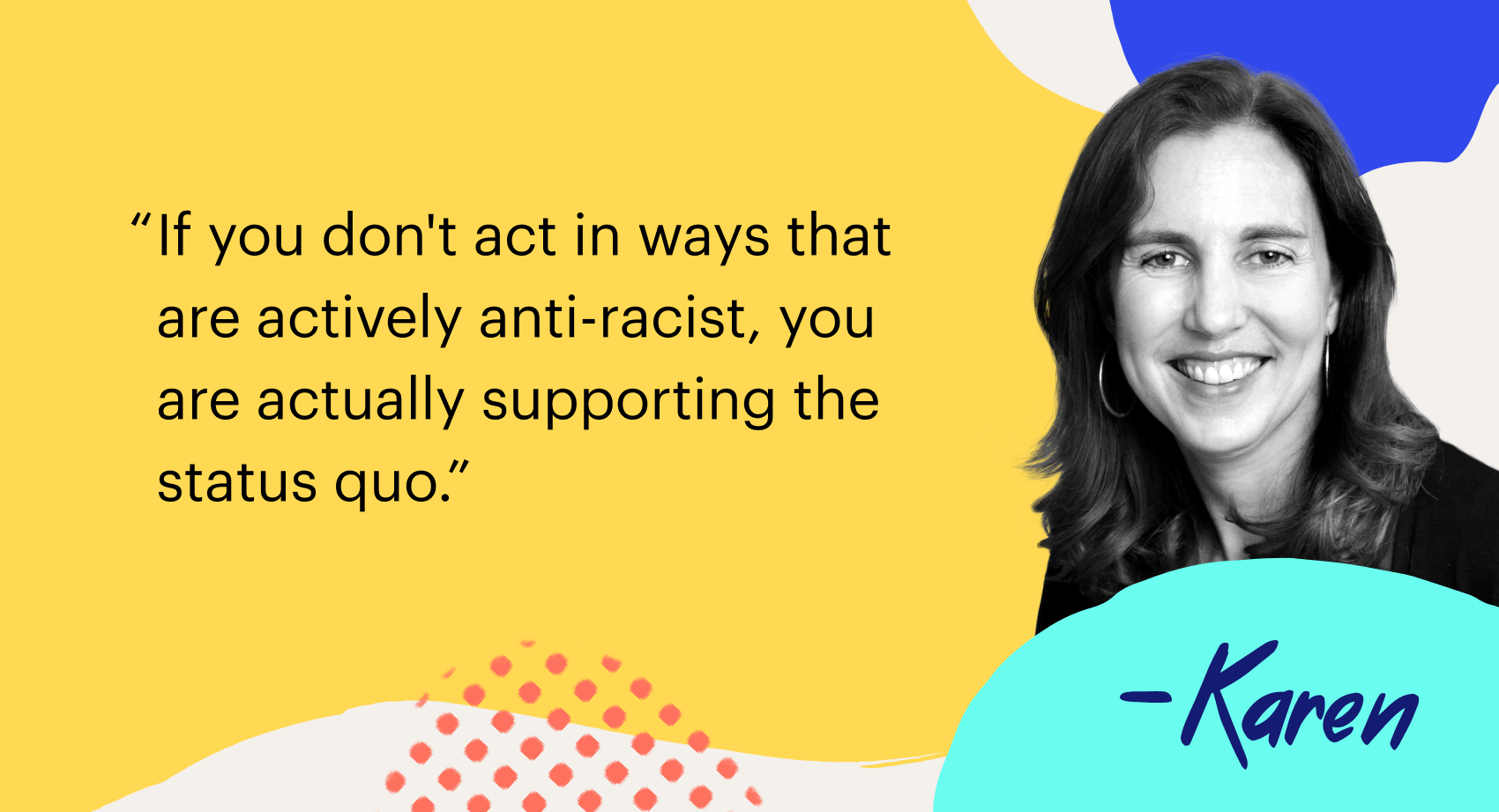
Karen: Yeah, fair enough. I think one of the things that’s also been on my mind is around diversity, equity, inclusion, and all the social unrest that has just kind of shined a light on things that were always there, but have now been brought to the surface. I’ve been thinking a lot that, as an industry, in tech, we haven’t done enough. And this is something that I’ve been really educating myself on.
I had always thought that it was enough to be kind and open and supportive of all different types of people. But that alone is not enough. If you don’t act in ways that are actively anti-racist, you are supporting the status quo.
One of the most meaningful books that I’ve read during the pandemic is How to Be an Antiracist. And the aha moment, for me, from that book and a number of other conversations, is that I had always thought that it was enough to be kind and open and supportive of all different types of people, and just looking for the best ideas and trying to bring out the best in everyone. It has always been kind of a life mantra of mine – I’m more interested in hearing what other people have to say, I’m interested in how I can bring out the best in others around me. And what I’ve realized is that kindess alone is not enough. If you don’t act in ways that are actively anti-racist, you are actually supporting the status quo.
And that was a huge aha moment for me, and so we as a company have been doing more, building new partnerships with diverse communities and focusing more and more of our outreach on diverse talent so that we bring in lots of different types of people. Having more diversity in our interview panels and really looking for who’s the best candidate, who can help us grow as a business and a company and do all the things we want to do, and have different types of thoughts and ideas to bring to the table. And we have also been investing a lot in training in allyship, and we’ve just added three more employee resource groups. And I think that’s a pretty big deal.
I’ve been super impressed with our allyship training. I think the very first one of those we had, out of a company of 600 people, over 300 people signed up to attend. This is an optional thing, it wasn’t required training. And we’ve had hundreds more come since then. One of the things I love about Intercom is that it’s a company that really cares about people and cares about helping each other and aiming to bring out the best in each other. So there’s a lot more we are committed to doing here, but we’re starting to take some first steps. There’s more work to do, but it’s something that we’re very much committed to.
“Where the easiest thing to do is to do nothing, the harder thing might be to do a lot and it might take a lot out of you, but the question is, what sort of person are you?”
Des: Yeah, it’s been an important period for the company in that regard. I know I definitely had to spend a lot of time; the best way to describe it is educating myself, as you described. And I think the one area that really resonated with me was what you said. It’s easy to initially misunderstand things as being: if I’m not doing anything wrong, then I’m not doing anything wrong, right? I think we all believe that to be true, but then history is littered with examples of people who didn’t do anything wrong, but it turns out did a lot of things wrong. And I realized that it’s not about what you do or what you don’t do, it’s about fighting for what you think the right outcome is in any situation. And if you’re not doing it, then at the very least, regardless of whether it’s being complicit, or whatever, at the very least, you have to acknowledge yourself.
Given the chance, you didn’t fight for the right outcome in that situation. And when you realize that, it’s yourself you have to justify that to for the rest of your life. It’s not about any particular third-party or independent movement, it’s, “Can you live with the decisions you make? And are you proud of the person you are in trying situations?” Where the easiest thing to do is to do nothing, the harder thing might be to do a lot and it might take a lot out of you, but the question is, what sort of person are you? I think when people ask themselves that question, it taps into them in a way that is much deeper than the more standard approach of, “As long as we’re good, then everything should be fine.” Because the reality is the world doesn’t work like that,and if there’s one thing that the pandemic did give me, it was a clearer mindset on that whole area.
Going upmarket
Des: But let’s think about something perhaps more positive in the future. When you think of Intercom in 2020 and beyond the years to come, what are you excited about? You mentioned upmarket. For me, the thing that’s exciting about upmarket – beyond, obviously, the implications for Intercom and tapping into these larger customers – is something that clicked for me ages ago when Microsoft signed up as a customer. I was having a discussion internally and someone was like, “Well, Microsoft is still just one customer.” And I thought, “No, a different way to think about this is that conversation by conversation, we’re going to make internet business personal. And we’ve just landed a business that has a lot of conversations.” Same as Amazon or Walmart. It is firmly in our mission to make internet business personal, and it’s impossible to do it without getting these larger folks who have probably had the majority of the conversations.
But when you think about the coming years, independent of how Intercom might approach a public market situation, what are your future plans and hopes for Intercom, both in terms of the business, the product, the culture, et cetera?
Karen: As I think about the future for us, I think it comes back to our mission of making internet business personal and doing that at scale. I mean, we already have 500 million conversations happening on the Intercom platform between Intercom customers and their customers. And then you start to add on some of these larger customers who’ve more recently joined, like an Amazon or a Facebook or a Walmart, and we start to see that opportunity increase 10X.
“I see Intercom becoming a consumer brand. The type of place where your parents and your brother-in-law know what you do”
I see Intercom becoming a consumer brand. The type of place where your parents and your brother-in-law know what you do. And that’s unusual for a B2B software company. A consumer brand where we help companies help their customers, where customers want to work with companies that use Intercom because they know that that signifies that they care about their customers, that they’re going to give them that kind of high-quality service and engagement. So becoming an end-customer brand and a company that’s known for connecting with customers, something that your brother-in-law will know, as I said, and truly reinventing categories.
If you think about what Salesforce did to CRM, creating CRM, reinventing it in the cloud – I see Intercom doing exactly that for customer interactions. Specifically for customer support, helping companies support their customers, and customer engagement, helping companies engage with their customers. You talked a little bit about the in-app ways of engaging with customers, in-app, email, push notification, omnichannel, things like that. Intercom will have fully developed every way that a company can interact with its customers, and it will be doing that in a way that is personal, automated, and proactive.
One of the things that we just recently launched that I’m super excited about is our customer support funnel and the new way of conversational support, next-generation support. Rather than a world where when you have a problem, you reach out – like going to the dentist when my tooth hurts – you get to a world where you’re actually proactive – you go to the doctor or the dentist before your tooth hurts. Companies don’t ever really do proactive support, this is a new thing. But imagine if before you had a problem, a company that you bought a piece of software from was helping to onboard you, anticipating what your problems were. That kind of concierge-level service to help our customer’s customers be successful – nobody does that today.
“Already, we’re finding that 33% of our customer’s most frequently asked questions, we can answer in an automated way”
It’s this idea that not every question needs to be answered by a human being. Like, “What are your store hours?” That’s not something that a person needs to answer, and one of the areas I’m really excited about is continuing to double down in automation. Already, we’re finding that 33% of our customers’ most frequently asked questions, we can answer in an automated way. So that’s just taking 33% of conversations and cost out of the picture, to begin with. And that’s now time that you can spend with customers in proactive ways, or providing a highly personal touch on things that really matter, versus, “What are your store hours?”
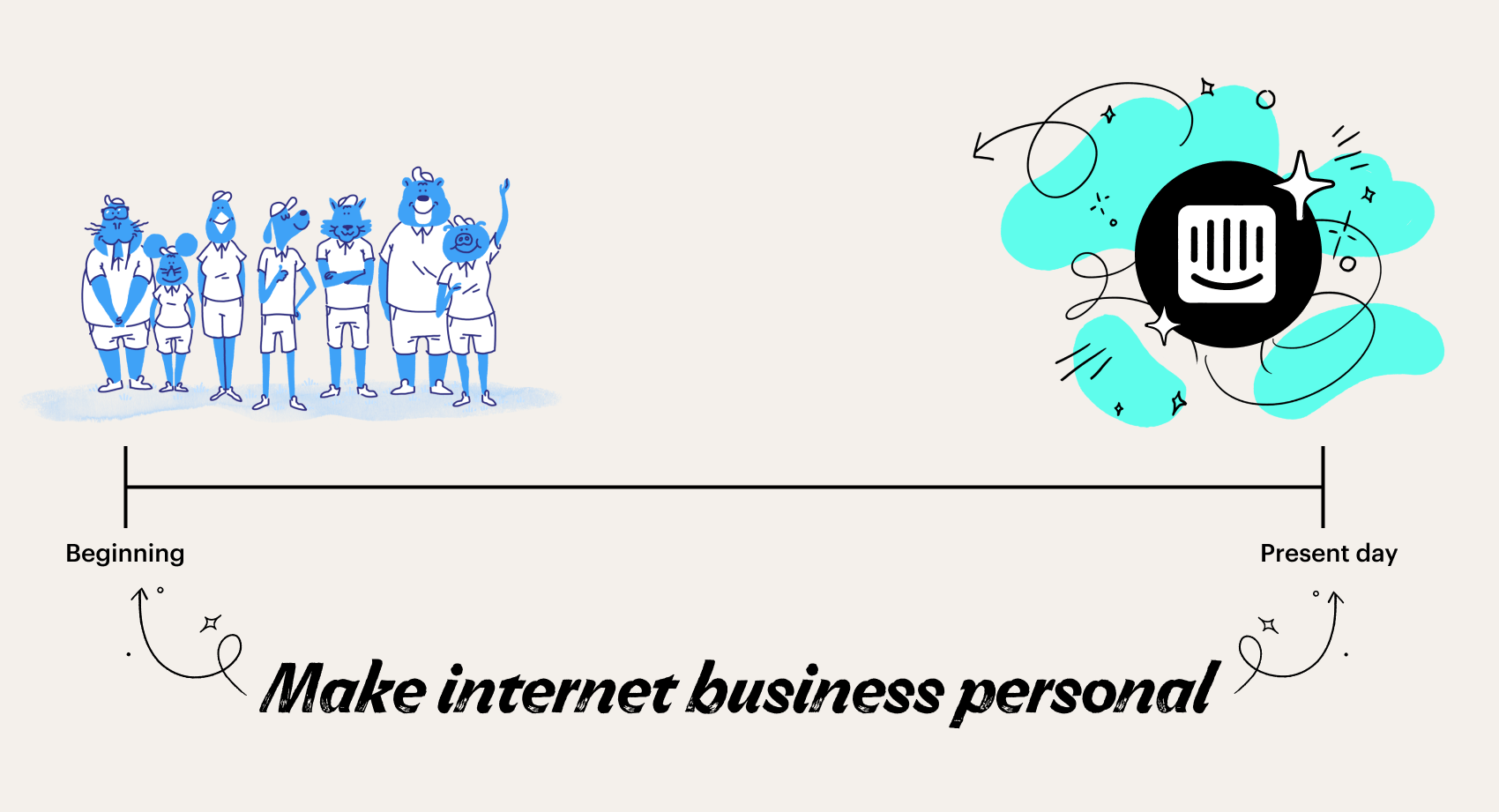
And the last phase of that, of course, is human support, because there will always be a role for human support. By getting the right conversation and the right customer to the right agent at the right speed, with the right background knowledge, with the right context, with the right ability to handle all the complexity behind that, the right routing; if it’s a bug, getting it to the right developer, etc. And so I’m super excited about fundamentally reinventing customer support – taking it from reactive to proactive, taking it from manual to automated where that makes sense, taking it from not consumer-friendly and clunky to a consumer-grade app level. Those are some of the things I’m excited about. What are you excited about for the future?
Des: I spend so much of my time in the product org, so I’m so deeply immersed in the areas of, say, the Conversational Support Funnel plus everything we’re doing in the engagement side of the house. But a recurring source of energy for me is just building software and showing it to users and seeing them respond. And that keeps me excited literally every part of the year. When I think about the longer time horizon, I definitely am excited about becoming a primary tool for large, significant industries. We have a lot of great customers there, but there’s a lot more who want to use this, for whom we’re just one feature away. And it’s never an exciting feature, it’s not a differentiator.
I’ll tell you the most embarrassing one I had. Recently, somebody was all excited to use Intercom and they wanted to onboard their 145 person support team. And, of course, us being a scrappy startup from startup land, despite being six or seven years old, the way you onboard a person to your support team is you fill out the form for one person at a time. Which, obviously, is a very laborious thing to do when you’re trying to add 145 accounts on the same day – it would basically take your entire day to do it. And the person, giving us the benefit of the doubt, very humbly asked, “Hey, sorry, I can’t find your bulk import screen.” And I was like, “Ah yes, the bulk import screen. I know it well. One second while I dig that out for you.” And I had to run around and go, “Well, our bulk import screen’s a little busy right now. If you could just give me a CSV, I’ll make sure that they get into the tool. Don’t worry.”
“Honestly, for me, when I think about the idea that the biggest companies in the world want to use Intercom and they’ll run on Intercom, the mission starts looking like it could come true”
But that exchange was really exciting to me because I was like, “Shit, that’s the level of complexity that has us not penetrating the Fortune 500.” It’s not like, “If only we had an offering.” One friend who works in a Fortune 50 company said to me, “I have all the reasons in the world why I want to buy Intercom, you just need to build for me the reasons why I can.” And that was really exciting for me because it made it very clear. Yes, we need to add a few features to the integration with this, or we need to make it possible to merge tags by the API or something like that, but it’s a known quantity of tactical things. There are 100 dials and if we move them all by one, we’re going to be 100X.
When I think about the next two or three years, now that we have a really good process for imbibing these things and getting a concrete release out that totally nails the reason, and then seeing the customer sign up on the far side and knowing that that’s a really healthy OODA loop because it consumes its own feedback and it iterates really quickly and it ships. Watching that flow even as recently as the last two cycles, so one quarter, and seeing the momentum that’s been built there is really exciting. In two years’ time, what will that look like? It will be a beast. And there won’t be a company on earth for whom we’re not adaptable. So that’s definitely a thing that really excites me.
I know I’m supposed to say, “Well, it’s actually an augmented reality feature, Karen. That’s what I’m really excited about.” But honestly, for me, when I think about the idea that the biggest companies in the world want to use Intercom and they’ll run on Intercom, the mission starts looking like it could come true.
Raising the bar
Karen: I think that’s exactly right. One of the things that I am so impressed with is the pace of shipping. I think Intercom ships products at higher quality levels, both in terms of bug qualities, but also in terms of product-market fit, and faster than really most any other company around. And I think that’s a real advantage. Getting that right feedback loop in place makes the future very bright.
In the years that I’ve been here, I don’t think we’ve ever pushed a release date by more than a week, which I’ve never seen in any business before. And we take on these big, audacious goals. For someone who’s working inside R&D, it’s incredibly exciting to be a part of such a high-functioning team that’s just delivering, month after month, quarter after quarter, amazing things to customers. And to be around top-notch colleagues doing that, it’s incredibly exciting.
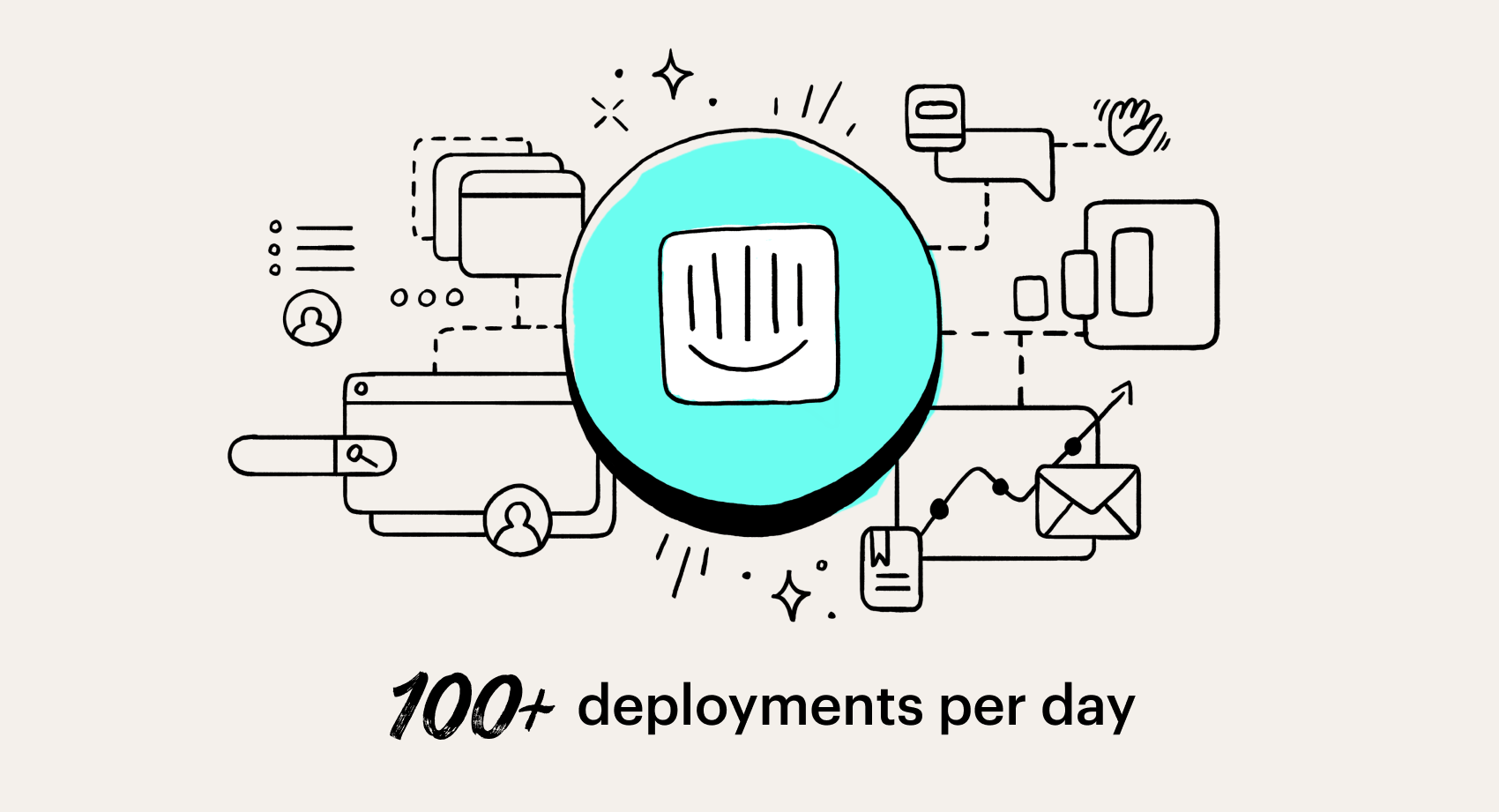
And if you’re not in R&D, that’s even better, because there’s nothing better than being a marketer with a lot of awesome stuff to talk about. So that’s always one of the things that makes me particularly excited. So let me ask you one last question, which is: if you guys were giving advice to somebody who’s joining Intercom right now, what would that be?
Des: Intercom is made up of two or three pretty hardened decisions. Our mission is to make internet business personal. We build software. I nearly stopped there, but like you say, we have a target customer that we’re trying to build for. Everything else about us is malleable and we’re open to push. We’re open to questions about why certain things aren’t good. There are things that we are still learning, and we want great people who can teach us more, even if it’s just to poke holes in areas where we have been turning a blind eye on.
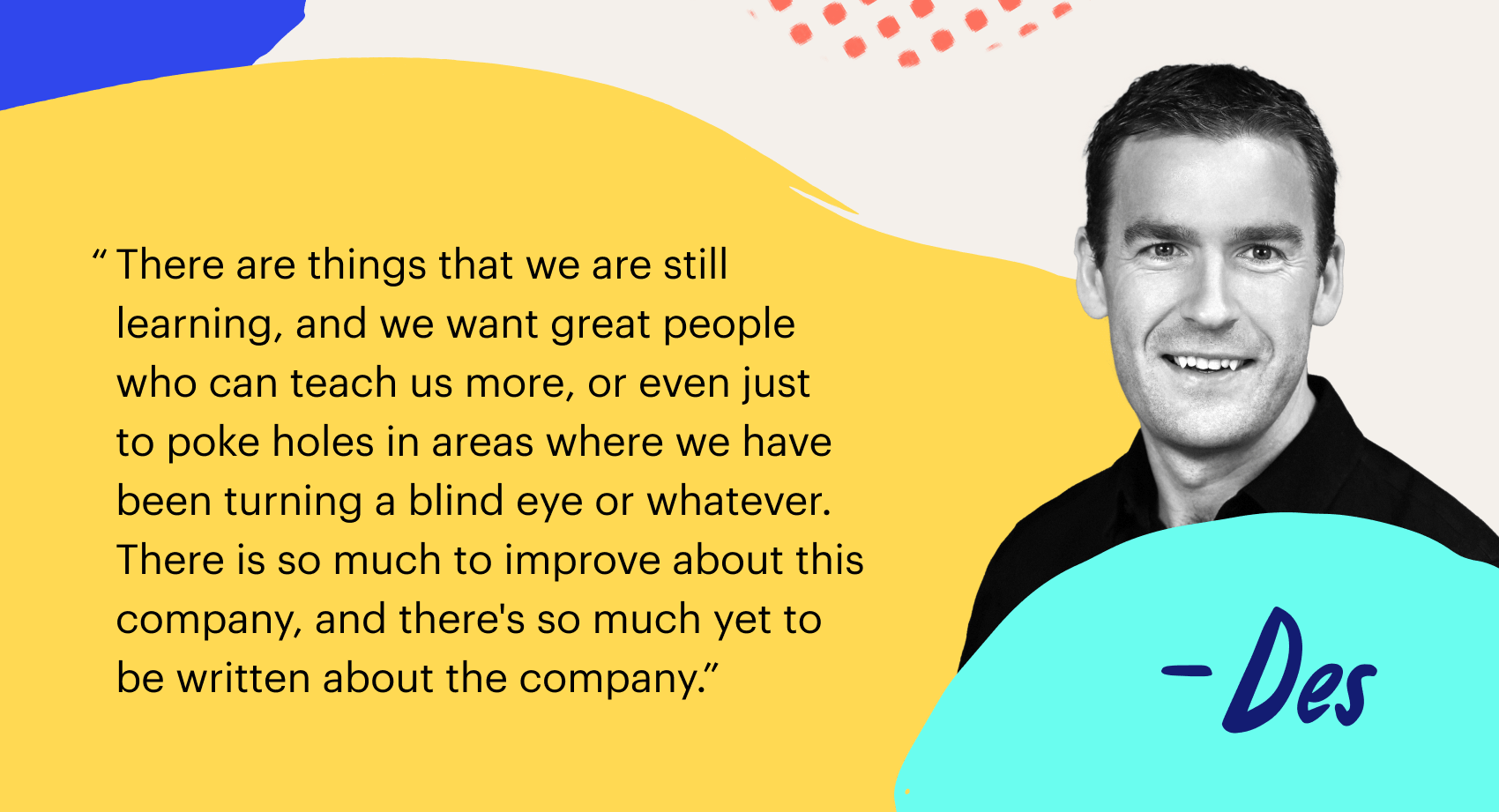
There is so much to improve and there’s so much yet to be written about the company. So my advice to somebody – if they want to get on my good side, anyway – is please join and tell us how we can be great. There are lots of good things we can point to, but one Intercom value is that we are confident yet humble. I’m confident we’ll be a fantastic company. I’m also humble enough to say that I don’t see “fantastic-ness” everywhere I look all the time. So, welcome to Intercom and I hope you can help.
Karen: I think that’s right on. I don’t want to be in a place where everything’s all written and I’m just kind of following the rules along the way. If I were to give one piece of advice, I’d say, “Spend time with customers.” Really get to deeply understand their world, their challenges, their priorities, and the other tools and things that they work with. Figure that out and understand that firsthand, and use that to help us get better at delivering value for customers, to better solve problems in a way that’s right for them. Think about the end-to-end customer experience. And this is not just for people in R&D. People in marketing and finance, on our people team, on our sales team – think about what is that end-to-end experience that you want to have for your customers and how we can make that amazing. Because I very much believe that when you delight customers, when you deliver great value and you keep raising the bar for yourself in how well you do that and keep reinventing things, great things happen.
Des: Awesome.
Karen: Des, thanks very much. This was really fun.
Des: Well, hey, we should do it again sometime.
Karen: I’d love to do that. Take care everyone. Have a good day.

